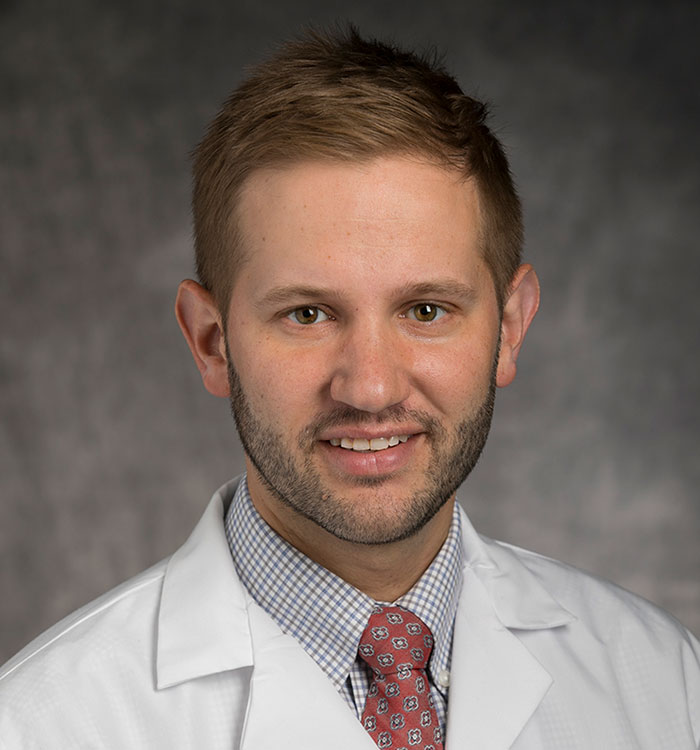In the Spotlight: New UH Urologist Adam Calaway, MD, MPH
November 10, 2019
Offering expert urology and urologic oncology care to Northeast Ohio and beyond
Innovations in Urology | Fall 2019
 Adam Calaway, MD
Adam Calaway, MD“This is an exciting time within our department,” says Adam Calaway, MD, MPH, Urologic Oncologist at University Hospitals Urology Institute and Assistant Professor at Case Western Reserve University School of Medicine. “There is new energy and investment from the hospital and an influx of physicians who are enthusiastic about working together.”
A native of Akron, Ohio, Dr. Calaway returned to Northeast Ohio this summer with his wife, a fellow physician he met when they were anatomy partners. He is among the generation of new leaders at UH Urology Institute.
With expertise in the treatment of urologic oncology, including testicular, kidney, prostate and bladder cancer, Dr. Calaway has specialized training in retroperitoneal lymph node dissection (RPLND), a high-risk surgery for advanced testicular cancer. He completed his residency and fellowship at Indiana University, which is world renowned for changing the outcomes for this disease. Prior to 1970, the cure rate was less than 10 percent. In the early 1970s, physicians at Indiana University revolutionized treatment methods by pairing aggressive chemotherapy combinations with radical surgery. “This is one of the best examples of medical success in cancer treatment,” says Dr. Calaway. “When guidelines are followed appropriately, outcomes are excellent for all stages of this disease presentation.”
Today, the overall survival rate for testicular cancer is greater than 95 percent, according to the Testicular Cancer Society. “Because mortality rates are so low, in recent years the focus has been on altering the morbidity of the disease by reducing chemotherapy toxicity and improving its tolerability, carefully selecting patients and improving recovery for those who need aggressive surgery — without diminishing treatment effectiveness,” says Dr. Calaway. “It is crucial to have providers who are comfortable with the nuances of managing this complex disease.”
HIGHLY SPECIALIZED OPEN SURGERY
As testicular cancer spreads, retroperitoneal lymph nodes are affected. RPLND is a highly specialized open surgery, in part because the retroperitoneum is surrounded by critical arteries and veins. Dr. Calaway has successfully performed the complex procedure more than 150 times. His training and expertise offer patients throughout the geographic region the option to seek transformative testicular cancer care closer to home.
In addition, offering RPLND at University Hospitals provides residents with a unique opportunity to observe and participate in the rare open procedure. “This impacts resident training because many urologic surgeries are performed robotically or laparoscopically,” says Dr. Calaway. “Open surgical experience is dwindling in many urological training programs. Although I am a firm believer in minimally invasive approaches, certain complex cases require an open incision in order to appropriately treat and manage the patient.”
TACKLING PUBLIC HEALTH DISPARITIES
While completing his fellowship, Dr. Calaway also earned a Master of Public Health degree in Epidemiology, an extension of his interest in health disparities and risk factor mitigation. “Public health looks at ways to improve life and longevity for the global population,” he says. “Is there a socially determinant driver of disease that we can modify? How do ZIP codes or socioeconomic challenges relate to outcomes?” Currently, the urology department is looking at gender differences in the treatment of advanced bladder cancer.
PREHABILITATION
Dr. Calaway is also in the process of developing comprehensive preoperative, perioperative and postoperative protocols to improve outcomes for patients undergoing cystectomy for advanced bladder cancer. “Cystectomy is a long, complicated surgery with fairly high rates of perioperative morbidity,” says Dr. Calaway. “The concept of prehabilitation is gaining some attention nationally.” The idea is to connect patients to multidisciplinary health services prior to surgery to help them make changes that support their recovery process. Some examples include physical therapy, cardiovascular fitness and nutrition.
“It is rewarding to make a broader impact on outcomes that goes beyond day-to-day patient care,” he says. “Fortunately, there is a wealth of opportunity for collaboration at University Hospitals, both in clinical care and academic research.”
Dr. Calaway sees patients at University Hospitals Seidman Cancer Center, University Hospitals Cedar-Brainard Medical Building and University Hospitals Parma Medical Center. For more information about UH Urology Institute or urologic oncology services, please call 216-553-1595 or email Dr. Calaway at Adam.Calaway@UHhospitals.org.


